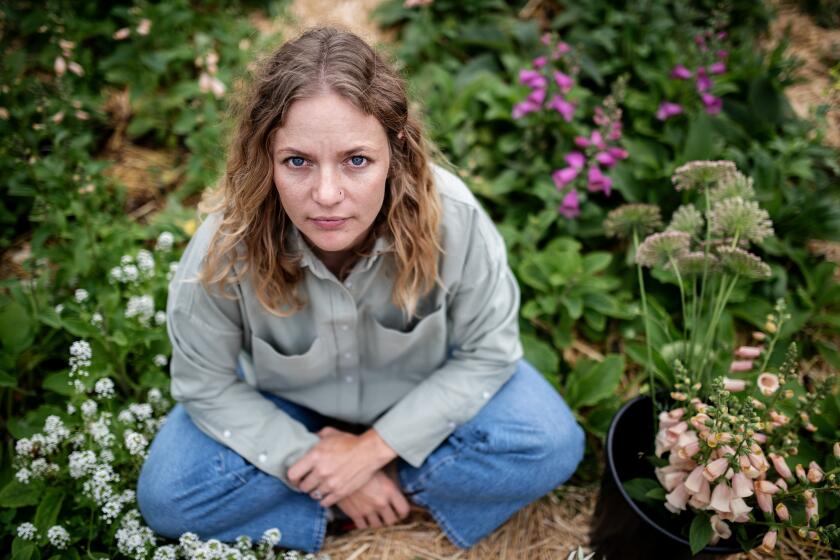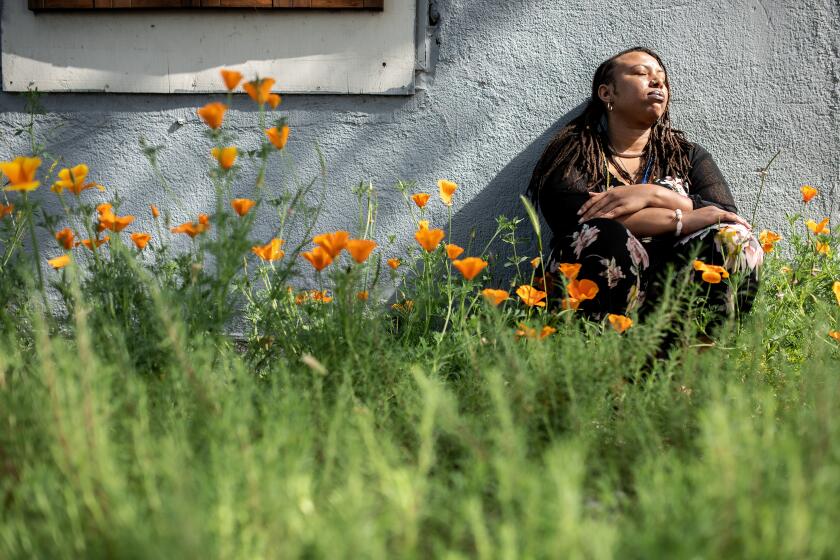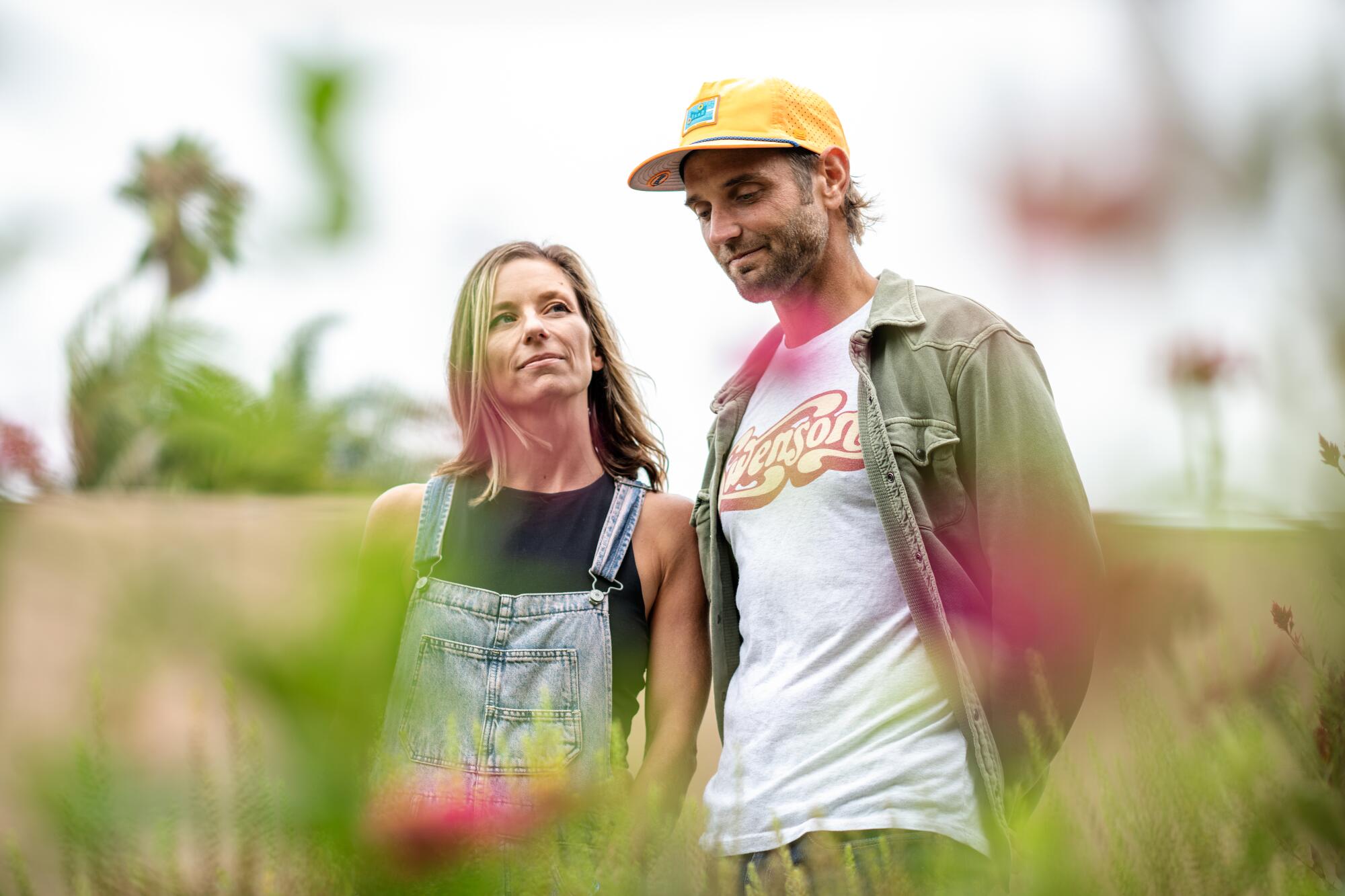
- Share via
Eight months after her husband, Chad, was diagnosed with Stage 4 lung cancer, Stacie Vanags planted 1,100 flower seeds in her Ventura backyard.
“Something called me to do it,” Stacie said of her tiny flower farm. “I needed a sanctuary.”
Chad, 40, and Stacie, 43, were already growing vegetables, tending a flock of free-roaming chickens and three cats and dreaming of building an urban farm on their half-acre of land next to the 101 Freeway in Midtown.
Then, in July 2022, Chad received some heartbreaking news.
During a routine visit to the doctor for what he presumed was long COVID after a persistent cough, Chad, who had never smoked, learned he had non-small-cell lung cancer. Scans showed the cancer had spread to his lungs, bones, lymph nodes and brain. In a gut punch, the oncologist told him he would live six months to a year without treatment.
“He said I’m incurable,” Chad said quietly.
That was 15 months ago.
During the pandemic, Rachel Nafis worked as an ER nurse. Burned out, she turned to flower farming and learned that being a florist is about more than just flowers.
Meeting Chad in person, it’s hard to believe he has a terminal illness. He appears to be in great physical shape, and he surfs regularly and travels the world for weeks at a time. He has had few symptoms or side effects besides lightheadedness from a targeted, Food and Drug Administration-approved medication called Tagrisso. But learning to live with cancer while trying to move forward hasn’t been easy for the tech sales trainer.
That’s why Chad says he’s grateful that Stacie can walk outside and tend to her flowers if his mood turns dark, especially when his depression becomes overwhelming some days.
“I had a tough seven days during a surfing trip to Puerto Escondido,” he said, standing in the garden as he watched his wife cut zinnias, chocolate lace flowers and strawflowers for gift bouquets. “It was hard for Stacie because she couldn’t escape to the flowers. I see the garden as a place where she can get a reprieve from cancer. It gives us purpose and meaning every day.”
Stacie doesn’t disagree. “I missed the flowers while we were in Mexico,” she said. “There’s a resiliency to plants. It’s a language in itself.”
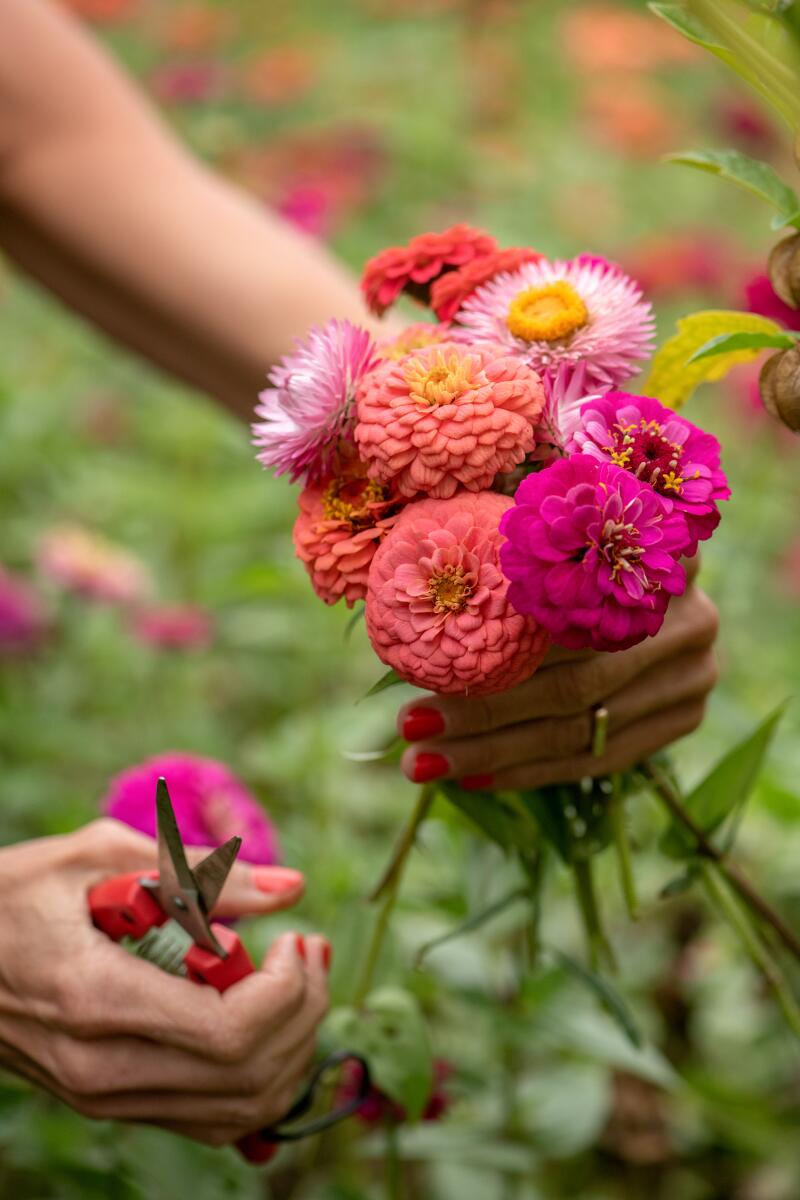
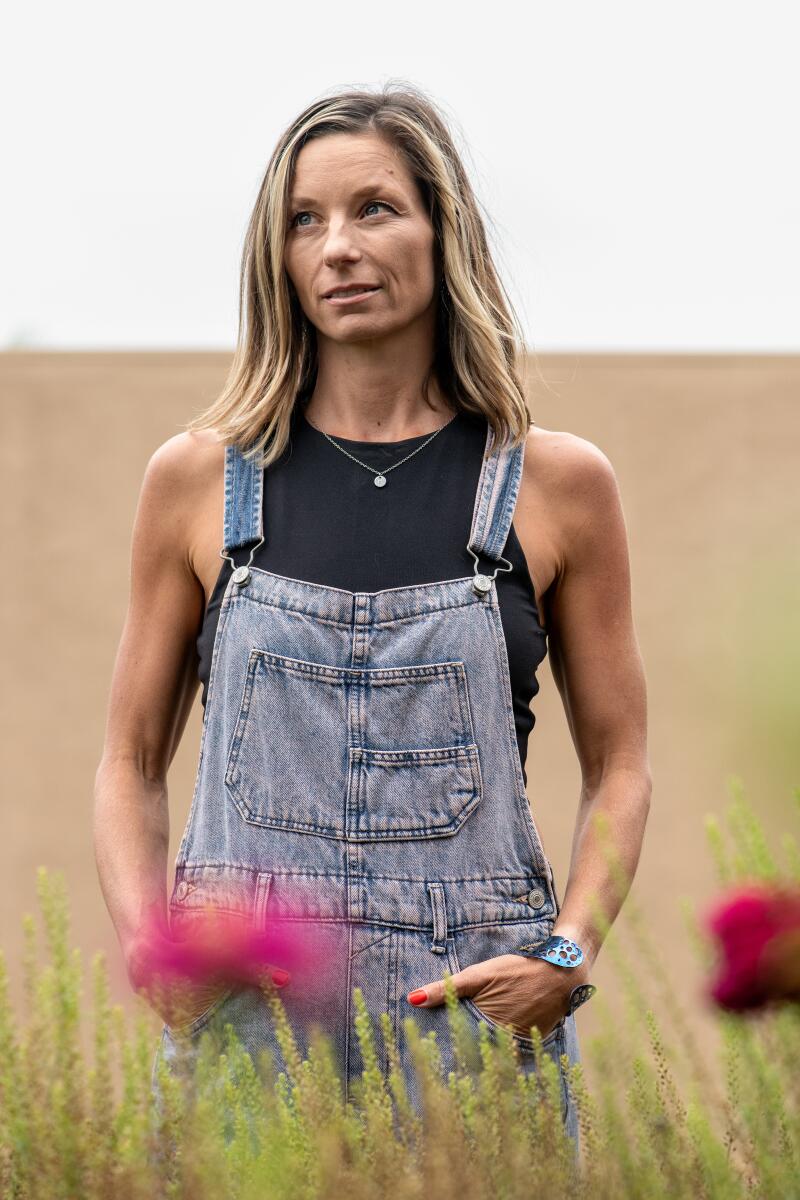
Stacie Vanags cuts zinnias and strawflowers in her backyard for a gift bouquet. (Mariah Tauger / Los Angeles Times)
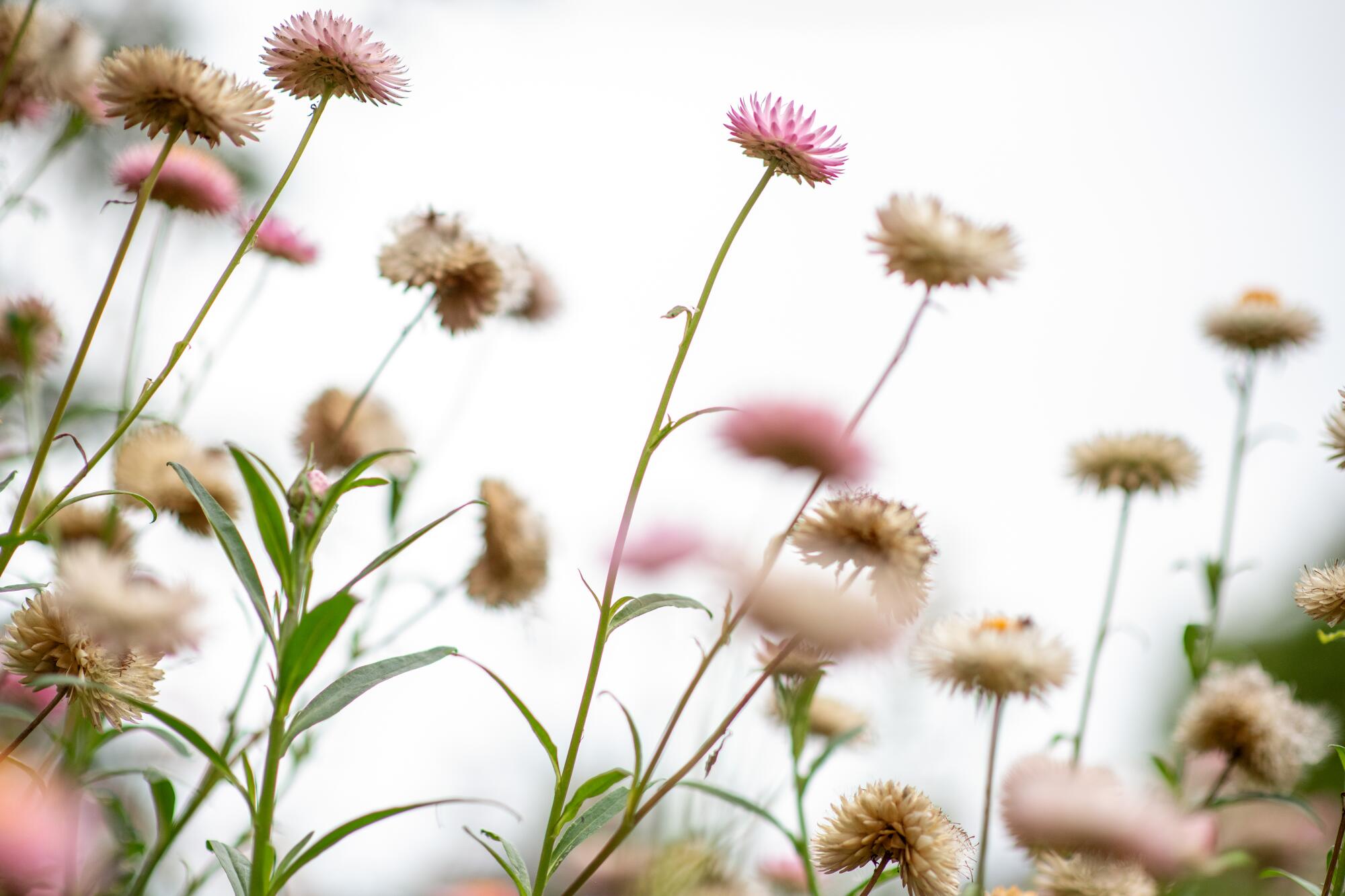
Like works of art, flowers can be interpreted however the beneficiary would like — as an expression of love, condolences or thanks. But their beauty and effect are not exclusive to those who receive them. They are also a gift to the gardener who tends them, waters them and watches them grow. “It’s like watching magic,” Stacie said.
The couple, who met in Chicago in 2008 and have been married for 11 years, were living in a 500-square-foot apartment in Culver City when they drove by the Ventura house in the early days of the pandemic in March 2020. The three-bedroom house needed work, but they immediately contacted the seller and made an offer after they saw its enormous backyard.
‘Nature has a way of holding and supporting us when we least expect it.’
— Stacie Vanags
The lot, which Caltrans used as a parking lot during the construction of the 101 Freeway decades ago, was dotted with overgrown morning glories, citrus trees and three old trailers. But it offered endless possibilities. The couple envisioned building a house in the back and renting out the front. Or creating a regenerative farm where they could live off the land.
They got the house and spent the next 11 months remodeling it before turning to the backyard, which they transformed into a micro-farm they call Teaquila Farm, named for their love of tea and tequila.
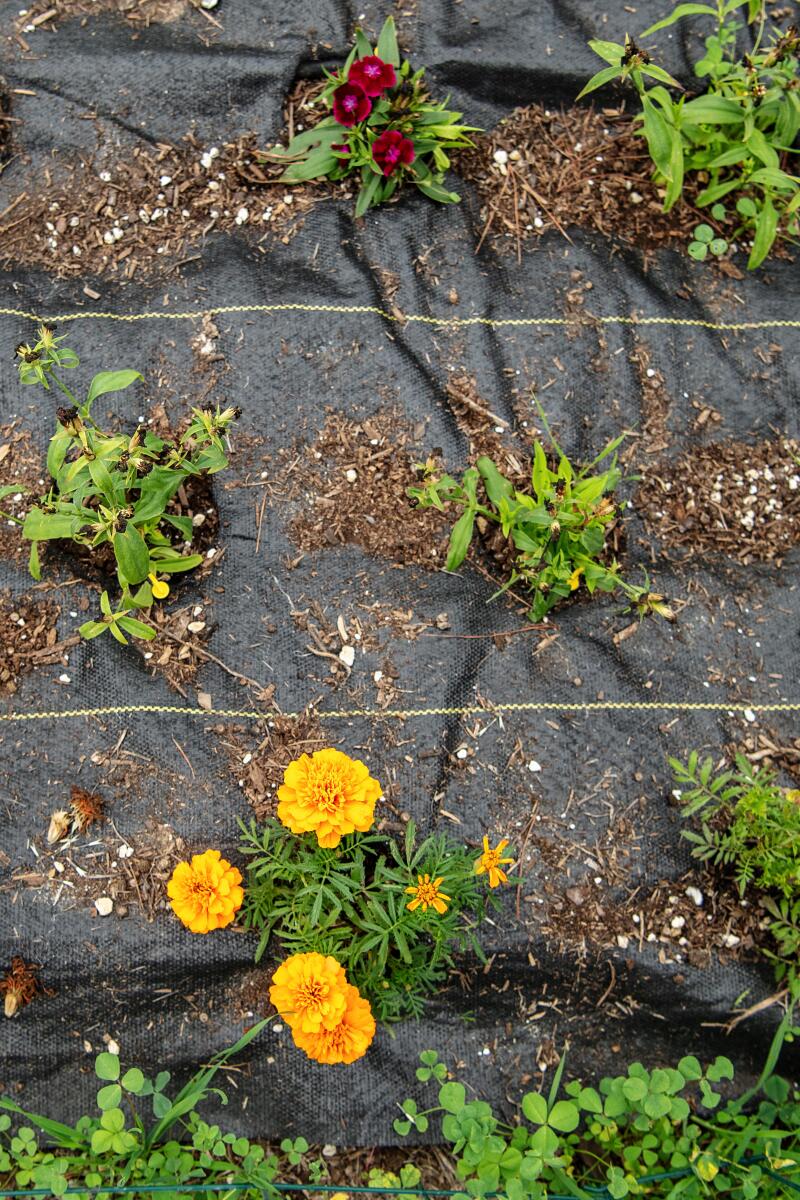
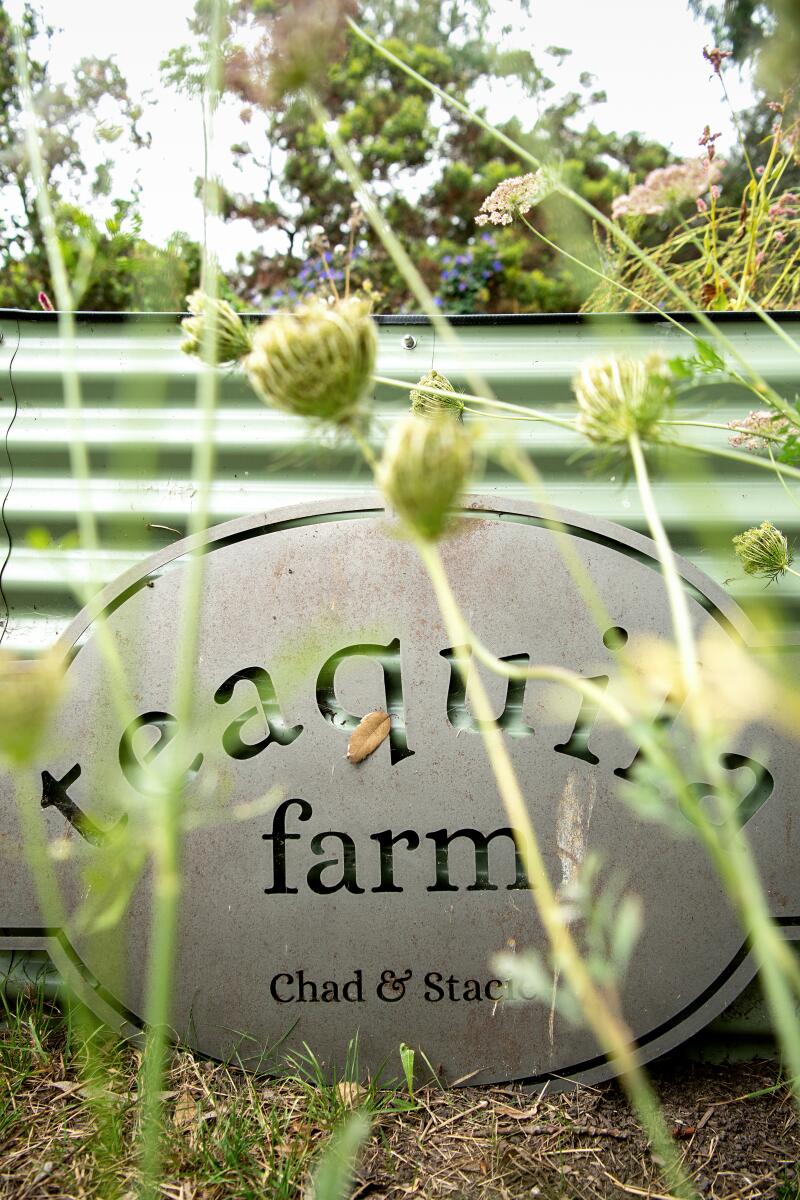
Dianthus, marigold and chocolate lace flowers bloom at Teaquila Farm in Ventura. (Mariah Tauger / Los Angeles Times)
Inspired by the 2018 documentary “The Biggest Little Farm” and the success of the Floret Farm seed company in Washington state, the couple cleared decades’ worth of gravel themselves with a rented Bobcat and amended the soil with three inches of organic topsoil and native California cover crop seeds.
When it came time to plant the flowers, Stacie, who had no gardening experience, was scared but pushed forward. “The biggest thing was just taking the leap of faith by reading the back of the seed packet and trusting in the process,” she said. “It’s easy to get caught up in all of the planning and logistics and never get started with ‘the thing.’”
While Chad was in India shooting what he describes as a “mission-based, purpose-driven adventure travel show” with his brother, Stacie spent three weekends layering her garden plots with organic compost after reading Erin Benzakein’s book “Floret Farm’s Cut Flower Garden: Grow, Harvest & Arrange Stunning Seasonal Blooms” and watching YouTube videos. With an emphasis on diversity and flowers that dry well, she planted 20 varieties, including zinnias, statice, honeywort, sweet peas and cress, using landscape fabric and a blowtorch to cut the fabric and prevent fraying. She estimates she spent about $800 on seeds, organic compost, seed starter soil, seed trays and a drip system, which Chad installed. “I’m the systems guy,” he said jokingly.
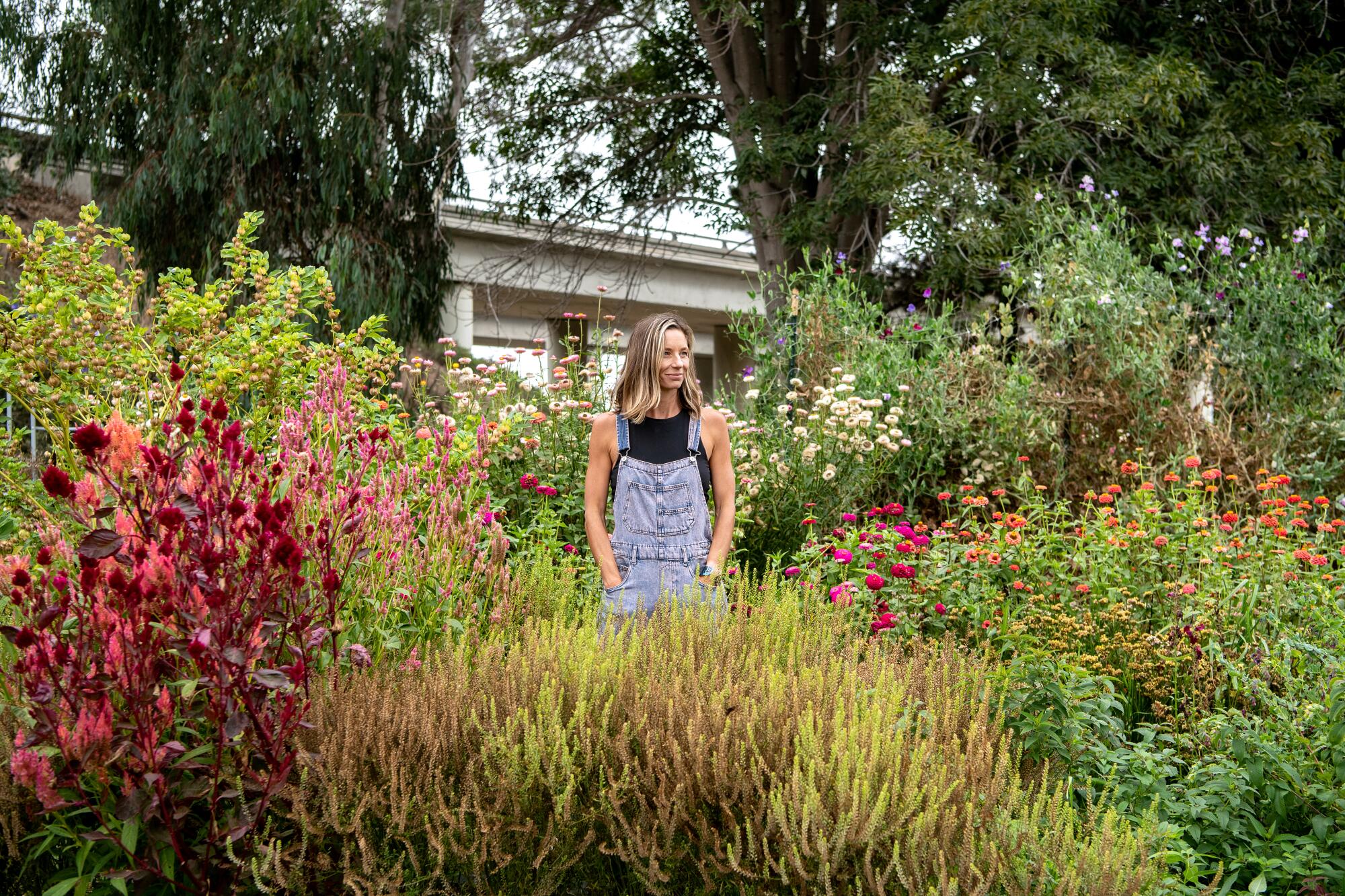
Much to Stacie’s delight, the garden took off after Southern California’s unusually wet spring this year. But she isn’t the only one who has benefited from her harvest. It is a healing sanctuary for others.
“Someone reached out to me on Facebook yesterday and asked me if she could come over and cut a bouquet because she’s been struggling lately,” said Stacie, who works for a digital therapeutics company. “Nature has a way of holding and supporting us when we least expect it.”
There have been others. During her inaugural growing season, Stacie invited neighbors and friends to cut bouquets during informal U-Pick sessions. She recently created centerpieces for a baby shower for 75 people. Looking ahead, she hopes to create flower arrangements for local businesses, host workshops on-site and develop a corporate wellness program that focuses on the benefits of flowers on mental health. The experience has empowered her to consider next year’s growing season, which she hopes will include dahlias, foxglove and amaranth.
Stacie said she never intended to grow flowers. “It was like nature was telling me, ‘You’re going to need this,’” she said. “I can leave my tears in the garden.”
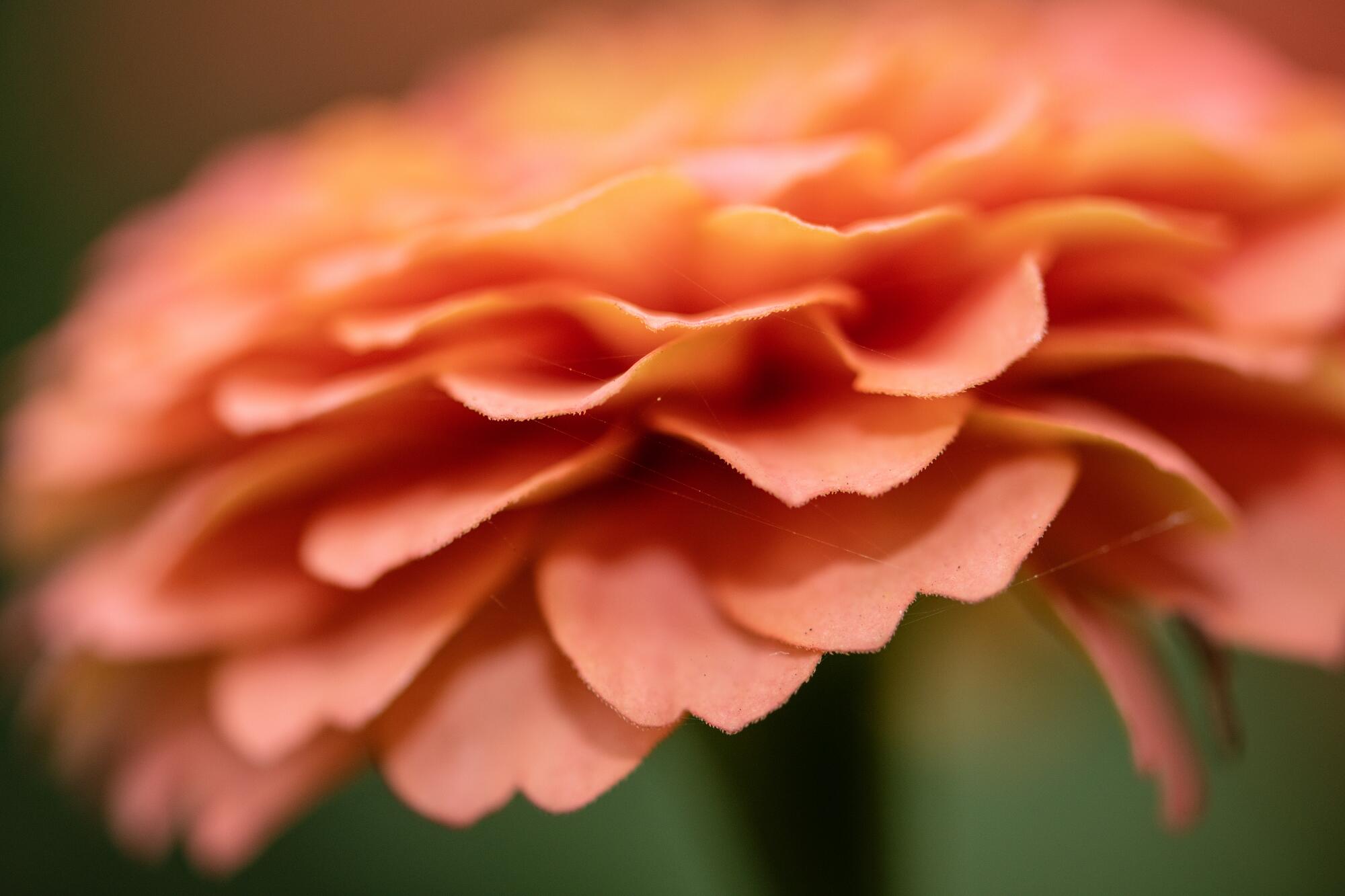
As someone who is independent and enjoys working alone, Stacie has used the act of planting the flowers and watching them grow to help her process Chad’s cancer diagnosis. “Seeing the beauty and resilience of flowers has given me immense comfort and hope during a pretty tough time,” she said. “I can’t imagine my life without them now.”
“The flowers are definitely a reprieve for her,” said friend and neighbor Sean McFatridge. “I’ve never heard her talk about how she is struggling. I think the flowers are a coping mechanism for her. While Chad focuses on squeezing everything he can out of life, Stacie uses the flowers as a therapeutic practice.”
In a densely populated Watts neighborhood desperately lacking green space, a Los Angeles garden is designed to facilitate healing and honor loved ones lost to violence.
For Chad, cancer is the end and also the beginning. He talks openly about his diagnosis to inspire others to live authentically. His videos on Instagram, where he “documents the beginning of the end” of his life, have gone viral, and he has amassed more than 102,000 followers. Still, he admits having debilitating anxiety, which he calls “scanxiety,” before the follow-up scans that track his cancer.
But being open about his health also has brought life-changing connections with others. “Cancer has taught me that people are good,” Chad said. “I appreciate people more now than ever before. And I give a lot more hugs.”
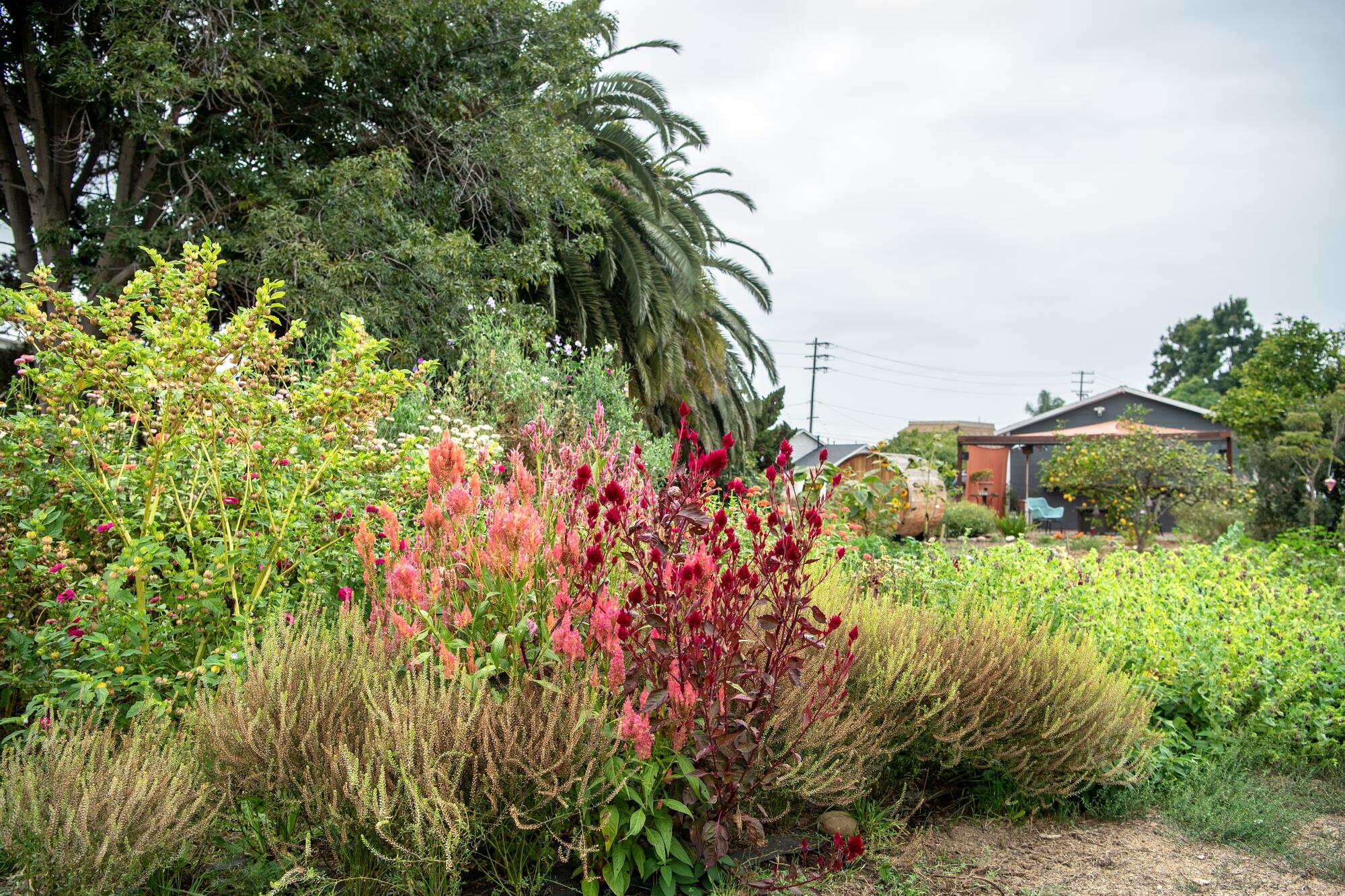
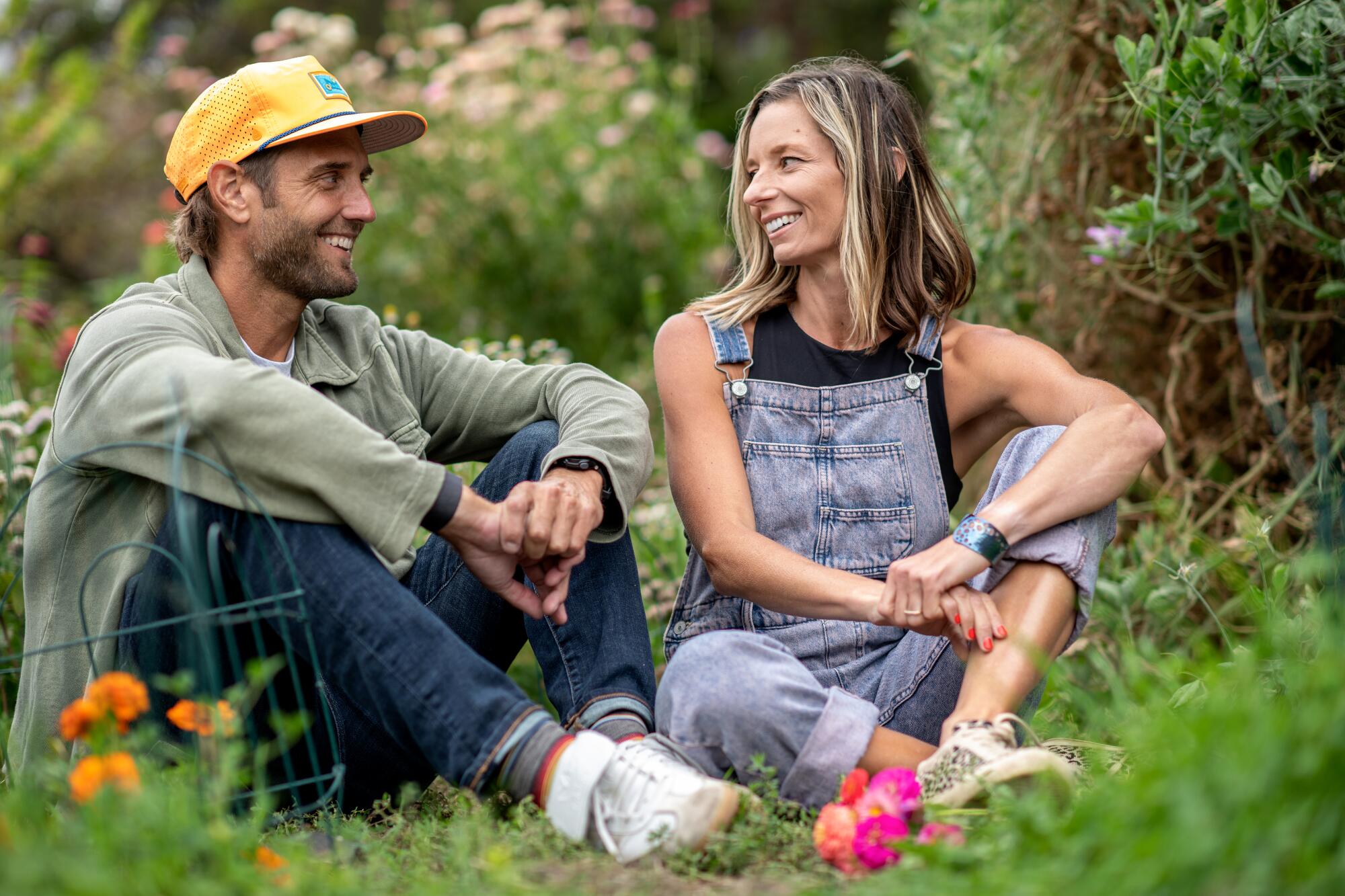
A week after Chad was diagnosed with cancer, McFatridge knocked on the couple’s front door and invited them to try his new CrossFit gym down the street.
Chad was still reeling. “I was angry and told him that I had been diagnosed with lung cancer and wasn’t up to working out right now,” Chad recalled.
An hour later, there was another knock on the door. McFatridge had returned. This time, he wasn’t selling door-to-door gym memberships.
“He said he couldn’t stop thinking about me and wanted to know if he could do anything to help,” Chad said. Then McFatridge and other gym members started a meal train for the couple. “It turned me around,” Chad said.
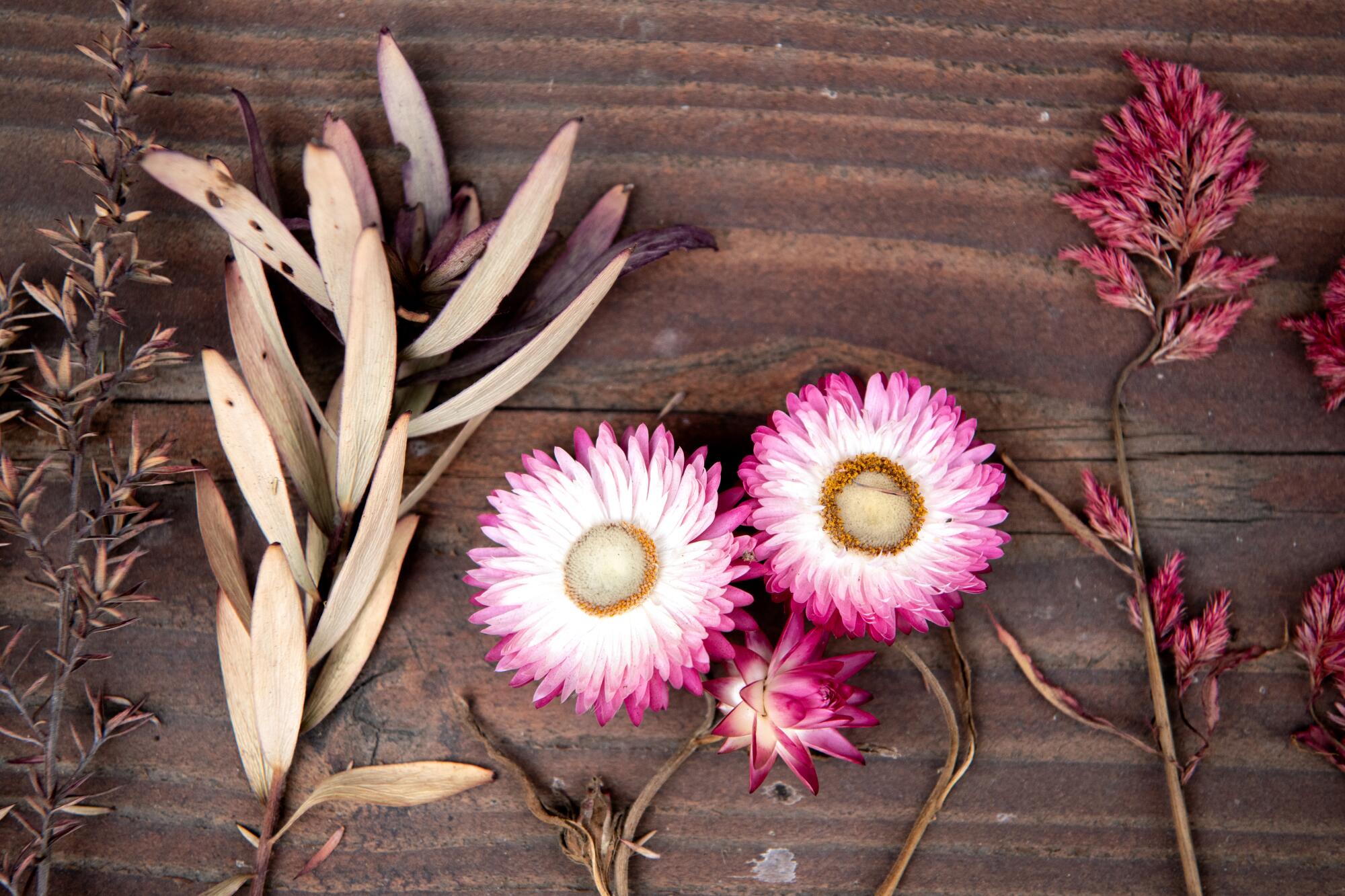
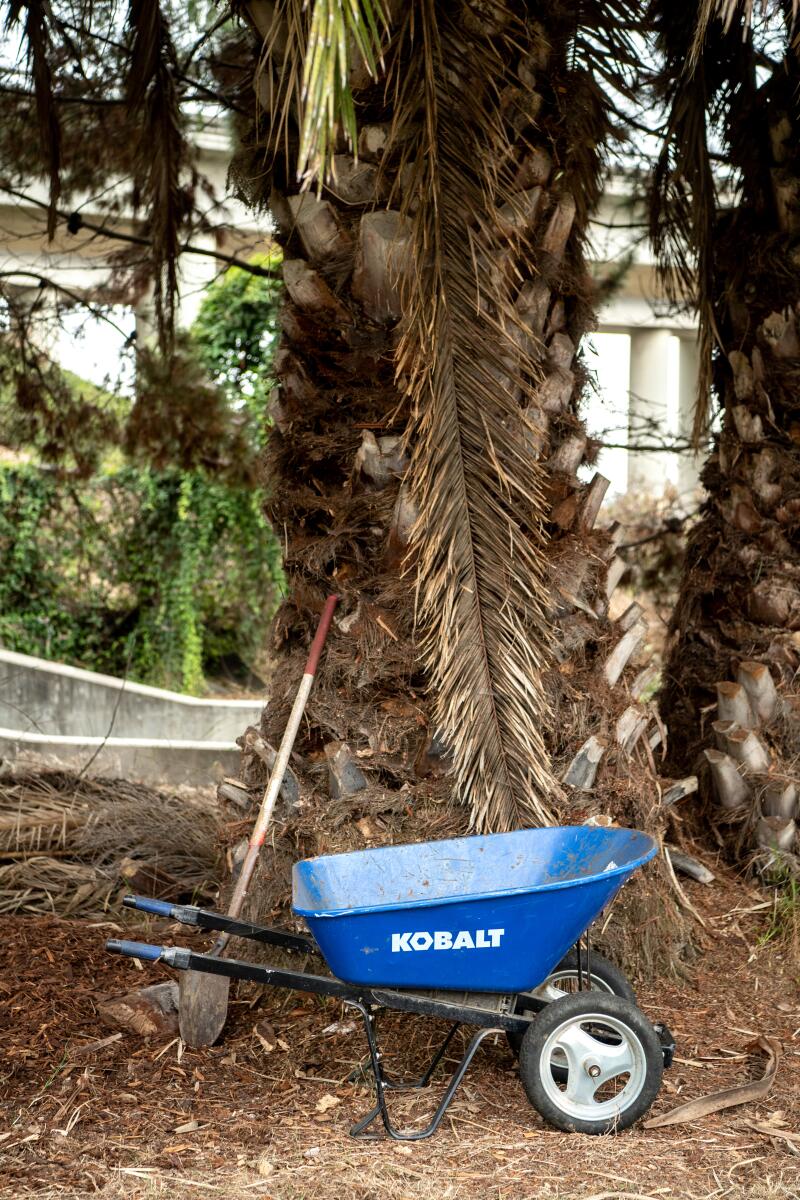
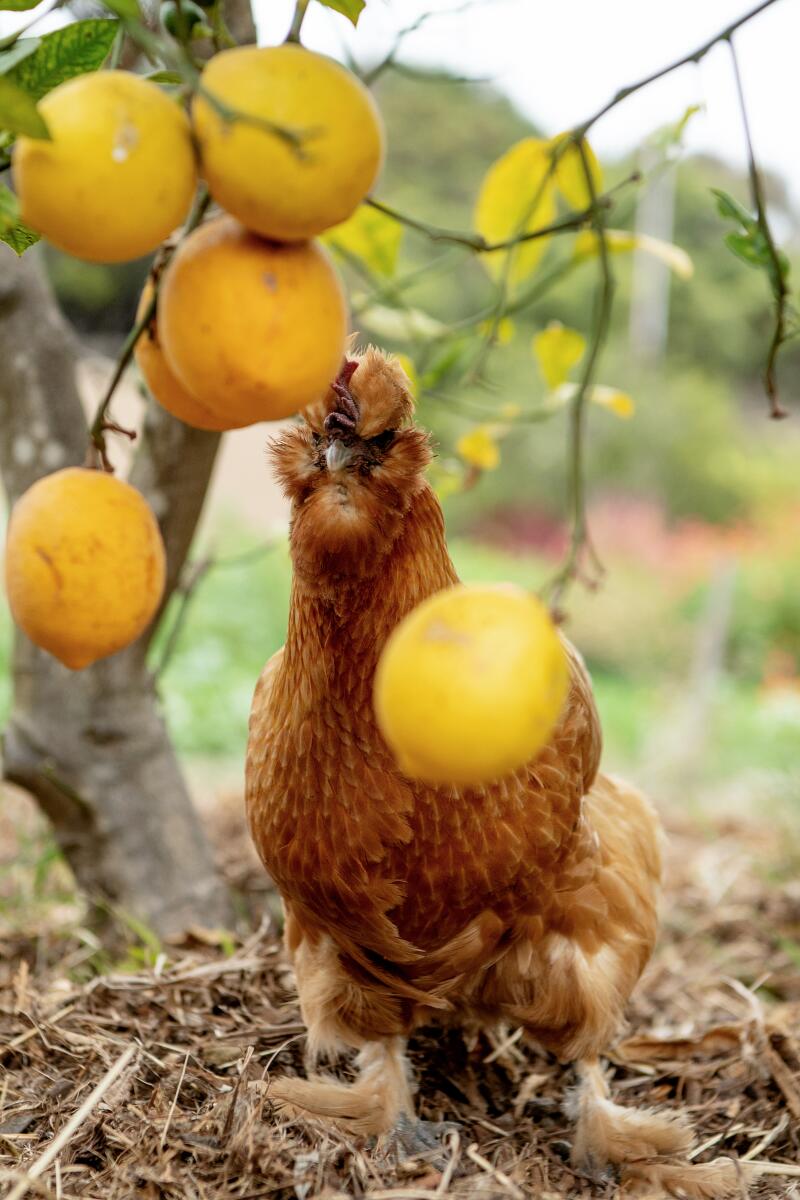
Scenes from Chad and Stacie Vanags’ tiny flower farm in Ventura. (Mariah Tauger / Los Angeles Times)
Today, aside from the adjacent 101 Freeway that remains a constant, much has changed at their Midtown Ventura homestead. The faded siding of their home is painted a warm gray. The front yard is filled with California native plants and pollinators. Strawflowers and seeds dry on the patio and dining room table. Butterflies and birds flock to the flowers that bloom in even rows in the backyard.
And Chad has outlived his dire prognosis.
Is it possible to absorb resiliency and hope in the face of a terminal illness? Stacie thinks the flowers have helped; like nature and the ocean, they remind her that “there’s something greater than me out there,” she said.
“I didn’t seek out the flowers,” she added. “I’m convinced they found me.”
More to Read
Sign up for The Wild
We’ll help you find the best places to hike, bike and run, as well as the perfect silent spots for meditation and yoga.
You may occasionally receive promotional content from the Los Angeles Times.
